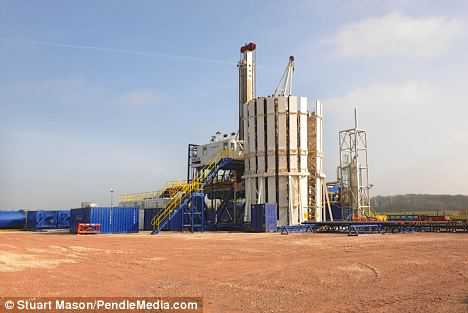‘Man-made’ earthquake strikes Blackpool… and consequences could be severe for UK’s gas drilling industry
By Daily Mail Reporter

Shale gas drilling – known as ‘fracking’ – is the process of fracturing rock deep underground using high-pressure water to extract gas.
The company behind the scheme, Cuadrilla, confirmed that it had been doing this just 1.2 miles from the epicentre of the tremor and has downed tools to investigate.
Experts believe the process could be behind the earthquake, which could have severe repercussions for drilling in the UK.
It follows a 2.3 magnitude earthquake at the beginning of last month, which also occurred near to the site at Preese Hall, near Blackpool.
Today, the British Geological Survey’s head of seismology, Brian Baptie, said the survey recorded the magnitude 1.5 earthquake shortly after midnight on Friday.
He said: ‘Data from two temporary instruments close to the drill site, installed after the magnitude 2.3 earthquake on April 1, indicate that the event occurred at a depth of approximately 2km or 1.2 miles.
‘The recorded waveforms are very similar to those from the magnitude 2.3 event last month, which suggests that the two events share a similar location and mechanism.’
The organisation said it could not say conclusively if the first earthquake, on April 1, was linked to the ‘fracking’ for shale gas but the its website said: ‘Any process that injects pressurised water into rocks at depth will cause the rock to fracture and possibly produce earthquakes.
‘It is well known that injection of water or other fluids during the oil extraction and geothermal engineering, such as shale gas, processes can result in earthquake activity.’
The shale gas exploration scheme near Blackpool has involved drilling a well 1.7 miles down into the earth, and then using ‘fracking’ to stimulate the rock around the well – a process which began in March.

WHAT IS ‘FRACKING’?
- It is a mining technique commonly used to get gas or oil from under land rather than under the sea.
- To get the gas out, companies drill down into shale and form a well. They then inject wells with water, small amounts of chemicals and sand to create tiny cracks in the rock, allowing natural gas and sometimes oil to flow upwards into the well.
- The technique could add about 40 per cent to previous estimates of global recoverable gas resources, with the largest known reserves are in China, the United States, Argentina and Mexico.
- However, It is now feared the process could be the cause of small earthquakes.
- Critics such as the Green party say that it is environmentally unsafe because the chemicals could contaminate soil and get into drinking water.
Cuadrilla Resources, the shale gas exploration company, confirmed it had postponed ‘fracking’ operations.
In a statement the company said it had decided to halt the work while it interprets seismic information received from monitoring around the site, following the small quake last Friday.
Mark Miller, chief executive of Cuadrilla Resources, said: ‘We take our responsibilities very seriously and that is why we have stopped fracking operations to share information and consult with the relevant authorities and other experts.
‘We expect that this analysis and subsequent consultation will take a number of weeks to conclude and we will decide on appropriate actions after that.’
Shale gas extraction has been controversial in the US because of claims that cancer-causing compounds used in the process have polluted water supplies – and that the gas can pollute drinking water, with footage of people able to set fire to the water coming out of their taps.
But earlier this month the Commons’ Energy and Climate Change Committee said a ban on shale gas drilling was not necessary in the UK, as there was no evidence that it posed a risk to water supplies from underground aquifers.
Following the news that ‘fracking’ had been suspended at the Lancashire site, WWF Scotland reiterated its call for the process to be banned.
It comes after it was revealed at the weekend that a company was seeking permission for Scotland’s first shale gas exploration at Aith, near Falkirk.
WWF Scotland Director, Dr Richard Dixon, said: ‘Whether the shale gas drilling and the earthquake are linked certainly needs investigated.
‘However, we already know enough about the environmental problems associated with fracking to know that it should be banned in Scotland.
‘Shale gas would be a disaster for the climate and its production could contaminate groundwater. Scotland should follow France’s example and ban it before it even gets going.
‘Scotland should become the home of clean energy not another dirty fossil-fuel. Shale gas projects in Scotland would quickly tarnish our global claim to green credentials.’
www.dailymail.co.uk, 1st June 2011

Leave a Reply